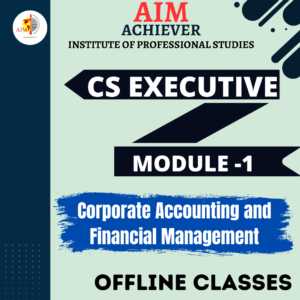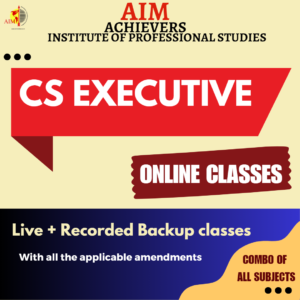|
Module2: Paper 5- Corporate & Management Accounting(Max Marks 100)
|
|
Part I: Corporate Accounting (60 marks)
|
-
Introduction to Financial Accounting
-
Introduction to Corporate Accounting
-
Accounting for Share Capital
-
Accounting for Debentures
-
Related Aspects of Company Accounts
-
Financial Statements Interpretation
-
Consolidation of Accounts as per Companies Act, 2013
-
Corporate Financial Reporting
-
Cash Flow Statements
-
Accounting Standards (AS)
-
National and International Accounting Authorities.
-
Adoption, Convergence and Interpretation of International Financial Reporting Standards (IFRS) and Accounting Standards in India.
-
Case Studies & Practical Aspects.
|
|
Part II: Management Accounting and Valuation (40 marks)
|
-
An Overview of Cost
-
Cost Accounting Records & Cost Audit under Companies Act, 2013
-
Budget, Budgeting and Budgetary Control
-
Ratio Analysis
-
Management Reporting (Management Information Systems)
-
Decision Making Tools
-
Valuation Principles & Framework
-
Valuation of Shares, Business and Intangible Assets
-
Accounting for Share-based payments (IndAS 102)
-
Business and Intangible Assets
-
Methods of Valuation
-
Case Studies & Practical Aspects
|
|
Module 2: Paper 6: Securities Laws & Capital Markets(Max Marks 100)
|
|
Part I: Securities Laws (70 Marks)
|
-
Securities Contracts (Regulations) Act 1956
-
Securities and Exchange Board of India Act, 1992
-
Depositories Act, 1996
-
An Overview of SEBI (Issue of Capital and Disclosure Requirements) Regulations, 2009.
-
An Overview of SEBI (Listing Obligations and Disclosure Requirements) Regulations, 2015.
-
An Overview of SEBI (Substantial Acquisition of Shares and Takeovers) Regulations, 2011.
-
SEBI (Buyback of Securities) Regulations, 1998
-
SEBI (Delisting of Equity Shares) Regulations, 2009
-
An Overview of SEBI (Share Based Employee Benefits) Regulations, 2014.
-
An Overview of SEBI (Issue of Sweat Equity) Regulations, 2002.
-
SEBI (Prohibition of Insider Trading) Regulations, 2015
-
Mutual Funds
-
Collective Investment Schemes
-
SEBI (Ombudsman) Regulations, 2003
-
Case Laws, Case Studies & Practical Aspects
|
|
Part II: Capital Market & Intermediaries (30 Marks)
|
I. Primary Market
II. Secondary Market
|
|
Module 2: Paper 7- Economic, Business and Commercial Laws(Max Marks 100)
|
|
Part I
Foreign Exchange Management &NBFCs (40 Marks)
|
-
Reserve Bank of India Act, 1934
-
Foreign Exchange Management Act, 1999
-
Foreign Exchange Transactions & Compliances
-
Foreign Contribution (Regulation) Act, 2010
-
Foreign Direct Investments – Regulations & FDI Policy
-
Overseas Direct Investment: ODI Policy, foreign currency remittances
-
Liberalized Remittance Scheme: Investment Outside India by Indian Residents.
-
External Commercial Borrowings (ECB)
-
Foreign Trade Policy & Procedure
-
Non-Banking Finance Companies(NBFCs)
-
Special Economic Zones Act, 2005
-
Case Laws, Case Studies & Practical Aspects
|
|
Part II Competition Law (25 Marks)
|
-
Competition Act, 2002
-
Case Laws, Case Studies & Practical Aspects
|
|
Part III
Business & Commercial Laws (35 Marks)
|
Consumer Protection
-
Consumer Protection Act, 1986
-
Essential Commodities Act, 1955
-
Legal Metrology Act, 2009
Property Law
-
Transfer of Property Act, 1882
-
Real Estate (Regulation and Development) Act, 2016
Anti-Corruption Laws
Business Laws
-
Indian Contracts Act, 1872
-
Specific Relief Act, 1963
-
Sale of Goods Act, 1930:
-
Partnership Act, 1932
-
Negotiable Instrument Act, 1881
-
Case Laws, Case Studies & Practical Aspects
|
|
Module2: Paper 8- Financial and Strategic Management(Max Marks 100)
|
|
Part I: Financial Management (60 marks)
|
-
Nature and Scope of Financial Management
-
Capital Budgeting
-
Capital Structure
-
Sources of raising long-term finance and Cost of Capital
-
Project Finance
-
Dividend Policy
-
Working Capital
-
Security Analysis
-
Portfolio Management
|
|
Part II: Strategic Management (40 Marks)
|
-
Introduction to Management:
-
Introduction to Strategic Management
-
Business Policy and Formulation of Functional Strategy
-
Strategic Analysis and Planning
-
Strategic Implementation and Control
-
Analysing Strategic Edge
|





Reviews
There are no reviews yet.